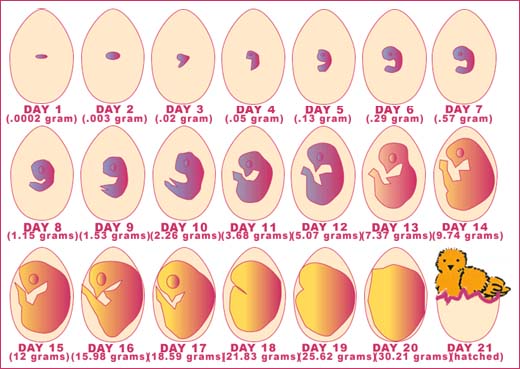Do you know what an incubation period is? It’s the length of time when an embryo develops within an egg, until it hatches.
Different types of eggs have different incubation periods. A chicken egg needs a 21-day incubation period under the right conditions (temperature, humidity, timely turning of the egg). If you crack an egg before it finishes incubating, you basically destroy the chick’s life and it loses its chance in this world.
Look at how a chick embryo develops from Day 1 to 21:

The development of a chick embryo. Just because we can’t see the chick developing inside doesn’t mean it’s not growing. (Image)

Developing chick embryo (Image)

A baby chick, out in the world (Image)
Incubation Period Everywhere
Incubation periods can be observed in many areas of our life. For example:
- A seed’s germination process is a two-day to week-long process which cannot be rushed.
- The development of a baby in a mother’s womb takes 38 weeks, and the mother will give birth when the child is ready to be born.
- In pathology, a flu virus takes about two days to incubate before the person develops flu symptoms (meaning a person who gets the flu virus will only show symptoms after two days).[1]
- In baking, it takes 30 minutes for a cake to be ready. Increasing the heat will not speed up this process. Instead, it will burn the cake.
- An apple takes 100-200 days to ripen.[2] Pick it too early and it will stop ripening.
In each case, the incubation process is necessary and cannot be rushed (not that anyone wants the flu). Even if everything looks the same on the surface, there are changes happening underneath. These silent changes are part and parcel of achieving the end result.
Likewise, our goals have incubation periods too. Just because you take action today doesn’t mean you will see results right away. For certain goals, you may need to take action for a while before you can see the rewards of your labor.
From Debt to $20k Monthly Revenue
This brings to mind my client M. When he came to me, he had a debt of US$200,000: built up throughout his 20s from study loans, bad financial habits, and frivolous spending. His goal was to clear his debt and to gain financial freedom.
As his debt was so big, clearing it was no overnight affair. There were many things we had to work through first, including working out a financial budget sheet, understanding his money beliefs (that caused him to be in so much debt), and building good money habits. Addressing his money beliefs in particular took a long time, as M started off very low in energy, unmotivated, and fuzzy in his thinking.
So despite M’s efforts, his debt issue remained the same. He was also constantly reminded of it: be it from regular bank letters asking for payment, overdraft notices when he was withdrawing money, or his inability to pay his staff on time (M runs multiple businesses). M felt imprisoned.
However, I reminded him that as his debt was the result of compounded actions over the years, we shouldn’t expect it to disappear overnight. It is more important to address the root causes of his debt, which were primarily linked to his bad money habits and attachment of his self-worth to money, because the faster we fix them, the sooner his debt situation will improve.
So we did that, and we worked on the roots of his problem, one by one. This happened over a few months.
From Financial Outflow to Inflow
Things started to change after awhile.
Firstly, he began to experience energy spurts after each coaching session. During these spurts, M would accomplish many things — the equivalent of what he normally does over two weeks. I told M that these spurts represent the abundant energy in him (just that they were blocked due to his worries), and were the start of more to come. True enough, he began to experience these energy spurts out of the blue, even when we haven’t had a call.
Then, he began to act on the action steps in his debt resolution plan, which were linked to his business growth. The results were astounding.
Because we cleared his mental blocks surrounding money, and because M has defined a clear vision for his business, he was able to laser-focus his energy on growing his business. In a matter of weeks, he began to clinch many new business deals. While his business revenue used to be US$4,000 a month, it has since increased to US$20,000 a month — a five-fold increase. He continues to clinch new deals today, some of which are recurring, which means recurring income.
M has been clearing a good chunk of his debt for the past few months. At this rate, he’ll be clearing it in a year’s time. With so many new deals now, M’s problem has grown into a new one — one where he has insufficient manpower. This is of course a luxury “problem” and is easily fixable (hire new staff, increase productivity).
Needless to say, M is extremely pleased. He knows that as long as he continues what he’s doing, he’ll soon be debt-free and financially free.
What Can We Learn?
What have you observed from M’s story? Despite working on his debt issue for months, M didn’t see results right away. Instead, he only did so only after a few months. That’s because he had to work on the roots of his problem. But when the results came in, they came in… fast.
The time lag between when he started taking action and when he saw results is the incubation period. In addition, he has been building his network and working on his business skills since four years ago. This means that his incubation period for his business success started four years ago.
Similarly, when it comes to our goals, there will be times when we take action without seeing results. It doesn’t mean that what we’re doing isn’t working. It may simply mean that our goal is in a development phase, going through incubation. During this time, actions don’t instantly lead to results. Rather, they build up to create a big impact when everything reaches a critical threshold.
Are You Incubating a Goal?
For whatever goal you are pursuing now, there is always a delicate development phase at the start. This is the incubation period, when your goal is slowly taking shape. While it may seem like nothing is happening, there is something happening… just not visible to your eye.
While the incubation period for a chicken egg is 21 days, this period varies depending on our goals:
- With a blogging goal, this period can be a few days to weeks as you create your blogging account, apply a template, set things up, and write your first post. With a goal to build an A-list blog, this period is easily years as you build your expertise in the subject matter, create quality content, drive traffic, and build loyalty among your readers.
- With a career switch goal, this period can be months to even a year as you do industry research, connect with headhunters, find job vacancies, go for interviews, and wait for the right job offer. Read my talent stack article on how a recent client did a career upgrade and got a 60% pay jump.
- With a healthy eating goal, this period can be months as well, especially if you’re an emotional eater, as you remove negative eating habits, work on healthy eating, and create a positive environment that supports healthy eating.
- With a goal to quit smoking, this period can be weeks and months as you work through your addiction issues, identify your relapse patterns, and work on those roots.
- With a goal to turn your passion into your career, this period can be months, typically years, as you spend 10,000 hours to develop your talent, create your plan, take action, and refine your plan along the way.

What goals are you incubating at the moment?
Generally, the bigger your goal, the longer your incubation period, since you’d need more time to build the foundations for a larger goal.
So what happens if you’re currently incubating? Do you get pissed off at the lack of results? Do you run amok like a headless chicken out of frustration? No, of course not!!!! All these are pointless as they will only frustrate you further and distract you from your main goal.
You want to continue with what you’ve been doing (because that will lead you to your end goal) and focus on your vision. Some tips that will help:
- Set milestones to evaluate your progress. Milestones are like little signposts to guide you to your final goal. Milestones let you know if you’re heading in the right direction. Examples of baby milestones for a blogging goal can be, (1) Achieve 10 visitors/day, (2) Achieve 50 visitors/day, (3) Achieve 100 visitors/day. The equivalent for a healthy eating goal can be, (1) Eat at least one healthy meal a day, (2) Eat at least one fruit/vegetable each day.
With these milestones set, focus on achieving them (as opposed to your distant end goal). If you are hitting them, that means you’re on the right track, even if you haven’t reached your end goal yet! Set more milestones and keep moving forward. You’re on the right path!
Surround yourself with success models. Who has succeeded in this goal? Keep them close to you and under your radar, such as in your social media feed, your newsletter subscriptions, your contact list, your meetup groups, etc. This way, you get the maximum positive reinforcement for your goal. The incubation period is a delicate period, so don’t allow anything negative to come close to you during this time (or ever, really).
Look out for success Easter eggs. Many goals give clues of its progress, even if you can’t see any major change yet. When you bake a cake, you can see the mixture “rise” through the oven door. The pleasant whiff of the cake can be smelled before the baking is completed too. With egg incubation, candling (using bright light to see the details inside a shell) helps you tell if any embryo has developed.
So say you’re starting a coaching business. A possible sign is friends telling you that your advice has helped them, even when you weren’t formally coaching them. Another possible sign can be your friends recommending others to sign up for your service, even though you didn’t ask them to!
For your goal, what are possible signs of success? Look out for them! They are the universe’s way of nodding at you and saying, “Yes, you’re doing great. Keep up the great work!!!”
- Work hard. The incubation period doesn’t end with the natural passing of time. Rather, you have to do due work before you’ll see success. Stay true to your plan and work hard. Read my time management tips to get things done.
- Be patient. As the saying goes, “Good things come to those who wait.” Put in your best effort, but be patient as well. As long as you put in the due work, the results will come soon enough.
- Most importantly, enjoy the process. At the end of the day, you’re not in a race. You’re in a journey of self-betterment, and your goals are but mediums to help you live a better life. Think about why you want to pursue this goal, and enjoy the process by living true to this message every second of the day. Before you know it, the incubation period is over and your goal has taken off. :)
Be sure to check out:







 I hope you find my content helpful. Join my community of 65,000 readers and get my latest articles delivered to your inbox. Your email is safe and I never send spam.
I hope you find my content helpful. Join my community of 65,000 readers and get my latest articles delivered to your inbox. Your email is safe and I never send spam.
This article perfectly describes where I’ve been in my life for most of 2014. The frustrating part of the incubation period is that while it’s perfectly clear in retrospect, it can seem unending when you’re moving through it. This is the scariest part of pursuing a dream because change, by definition, means doing something you’ve never done before, and consequently, don’t know how to do. Since we’re learning the ropes by sailing the ship, we’re probably going to go in circles for a while! This is also a delicate time to hear harsh criticism because our loved ones may not understand the unseen work we’re doing and say damaging things merely by accident. The “Easter Eggs” as you describe them, are what keeps me going. For a while, I was discouraged because I was getting lots of good feedback, but no real results. That was until I realized that, at that stage, I wouldn’t have been able to handle a mass influx of business, I needed to stumble a few more times first so I could learn to handle those situations. I’m still in the process, but I’m starting to reach the point where I can look backwards and see how far I’ve come.
Anyway… that’s a thought dump on the subject, I hope it helps anyone else who’s going through an incubation period, Great work as usual Celes!
This is a unique post and I love it. A lot of people will benefit this one and I thank you for that..
This is an excellent post Celestine. I agree with you about the incubation period. That is what I am going through right away with my blog.I have been working very hard and hoping to meet someone who will give me a push by recommending me in their community. I am grateful for the inspiration I have got from this site. Your achievements Celestine can be cited to tell the world we can achieve big dreams in life; that the domain of coaching on success can lead to marvels. Thank for making me see the work I am doing in a fresh light with great faith in the future.
It’s a great article. Useful advice too. :) thank u!
I’m glad you found it useful! Thanks for your kind comment Jingyun! :D
This is an inspiring post. :) When you’re working towards something if you don’t see results for a long time (or the exact results you want) then it can be really discouraging and you think about giving up but it helps to know that there is change going on under the surface, even if it doesn’t seem like it. If you work on yourself and your beliefs, things do change but it takes time.
Yes, exactly Moonsparkle! And I also want to add that it’s not just about working on our beliefs, but also following up with actions too. If we just work on our beliefs *only* then it’s suffice to assume that little to nothing will happen still, because action is required to complete the equation. And I’m saying this because I’ve met quite a fair share of people (self-help junkies for the lack of a better word) who literally spend years if not decades of their lives working on their beliefs and developing better self-awareness (which is really fantastic), but because they didn’t follow up with action, nothing ever really did change in the end (in their lives at least).
I see what you mean, Celes. It is important to take action too. :) It’s easy just to read a self help book but then not do any of the exercises in it or apply any of the things it suggests.
What a great article! I had never likened the process of achieving a goal to the “incubation” period before but what a great analogy. I am currently in the “incubation period” of creating a career as a Life Coach. You have included some great tips in your article and the one that hits home for me the most is to enjoy the process. As long as my goals line up with my values I know I am on the right track.
Hi Robin, you got that right! It’s most important that you’re pursuing goals that line up with your values and yourself. As long as you do that, and as long as you enjoy the process, results will come soon enough. Chasing after an end point without enjoying or liking the journey will only lead to much frustration — and eventually procrastination!
What an interesting idea! I have to admit, I had no idea what to except with an article about “incubation,” but I’m still glad I’ve read it (and re-read the “How to Finish What You Start” article)!
I think being patient and enjoying the progress are the most important tips listed here, even though I’m still working on the second. Realizing that your end goal is the result of steady progress rather than a few great feats is really helpful as well, and something I haven’t really appreciated until recently. Even now, I still feel the tendency to want to change everything and adopt all the habits I want to cultivate at once and work on a dozen different things at the same time. But in practice, I’ve found you really have to let yourself ease into things, and adopt change a little at a time over time rather than make big, sweeping changes. Otherwise, it’ll suddenly feel like much too much and you’ll think, “How can I possibly maintain this in the long run?” and it’ll be completely demotivating.
Another thing I’ve learned (although I’m not sure if this will apply to other people at all), is to look for the “true” place to start working on your goals. I’ve had any number of things I’ve wanted to start working on, but I never felt able to focus on and maintain them for long. But then I realized I was doing the equivalent of trying to build a house without preparing the land; here I was bringing in all of my bricks and mortar and trying to place them, but there was all sorts of trees and plants where I wanted to lay them down. In the past, I’d try and build around these things, but realize that I was essentially creating a house with a tree where a wall should be, and that just wasn’t going to work.
For me, this “preparing” has been to cultivate a lot of basic self-care habits, from simple hydration and a few minutes of movement each day, and slowly adding in habits of daily meditation/taking time to learn something new. Once I have these down, I’ll begin working on my goals that I’ve tried and failed to maintain before, because now I’ll have good, healthy habits in place that will have me in the right state of mind/health to actually do these tasks.
Thanks for another great post, Celes! =)
Hi Calae, I love your analogy on building a house on a land, and what a great analogy that is! Also to your point:
Yes indeed, and it’s especially important if you’re working through this huge goal that takes time. At the end of the day if trying to do too much leads to haphazard efforts and unsustainable change, then it may be best to scale down and work on a few small things at one go as you said–if that leads to the sustainable changes, then that’d actually be more effective than the former. As they say sometimes, “More haste less speed.”
Thanks so much for your wonderful comment! I hope all is well on your end, by the way? How is the Anti-Procrastination Program working out at the moment (which module are you working through right now)?
Thanks for the reply, Celes! <3
I hate to admit it, but I hit "pause" on the procrastination course. I realized in looking over my "whys" that, although they seem accurate on one hand, I didn't really feel the desire for these reasons like I previously thought. I also fought with the idea of doing/catching up with the course rather than actually taking action for my goals — I realize this isn't a fair way of thinking about it, but it lead me to going "back to basics" as I described before, which I think is necessary for me to get down before moving on.
This time of year with the seasons changing I tend to feel more "down" than usual, so I'm really trying hard to take it easy on myself and build myself up to what has felt like a huge goal of catching up with the course/taking actions on my goals. On one hand it feels like I'm just a failed student procrastinating on an anti-procrastination course, but on the other I think I'm doing what I should have done a long time ago. I've been adding onto my empowering habits slowly, and keeping track of everything using HabitRPG, so I can actually tell that I'm making progress which is nice.
Rest assured, I'll get back to it — the content is amazing, and I only wish I were personally ready for it in time for the live-run.
Hey Calae! I’d think about the course as something to integrate into one’s life, as opposed to something “to be done.” For example since you’re currently working on integrating habits — if you find yourself procrastinating on applying any habit, then you can work on the habit as the “goal” in the course, starting with Module 1’s “WHYs” (why do I want to cultivate this habit? What happens if I don’t work on this habit? Etc…), then with Module 2’s material on removing inner resistance (Any resistance to working on a particular habit?) and so on and so forth. Or even, if you find yourself procrastinating on working on the course, that funnily can be the subject matter to work through in the course too (which will be quite a revealing experience I’m sure!). At the end of the day, all the principles in the course are really applicable across all areas of life and all sorts of goals, because that’s how I’ve designed the course to be–timeless in principles and universal in application. That’s where the duality between “catching up with the course” vs. “taking action on my goals” shouldn’t exist too, because the act of working on the course is really meant to lead to the working on your goals (or at least, that’s how I’ve designed the course to be!).
From the sound of it though, I don’t think that you’re necessarily procrastinating on the course but that the goals that you originally defined in Module 1 (be it blogging, or so something else!) may be intimidating blocks at the moment, and the idea of having to face them headon with the course may have resulted in the overall resistance in general. If so, Module 2 talks about how to explore this resistance. Or maybe, it’s that these goals simply just aren’t what you need/want to work on at the moment like you’ve realized — in which case it’s simply about updating your “goals” to be the integration of the habits, as opposed to blogging and so on! For sure, work through the modules when you get the time to, but really, don’t sweat them as “things I’ve to do” but rather more as more of a self-exploration/self-reflection session than as “work,” because it’s really meant to be that.
This conversation we’re having reminds me of what I told Nancy (one of the participants) *before* the course started, when she told me that she has a lot of crises happening at her home and she wasn’t sure if she could attend the live classes at all. I just told her (not word-for-word), “Think about them as self-exploration outlets, and don’t even worry about the ‘homework’ and what not. Just attend and have fun along the way.” Funnily, using this approach, she actually wound up attending *all* the sessions (a huge surprise!) and made quite wonderful progress in HER personal goal DESPITE very serious family emergencies cropping *throughout* the eight weeks and having to hold the fort in her household (family members in hospital, son in car accident, her going in and of the hospital for different reasons; having to care for her children, etc.). This was really amazing, and I think even she was surprised herself!
So really, it just boils down working on what you feel are your priorities at the moment, and remember the course is meant as the channel that’ll help you work through your priorities, as opposed to being this intimidating block of material that you’ve to do on top of whatever you’re doing at the moment. Remember, you can always let me know if you’ve any questions about the material/modules, and I’ll always be one email away!
So I just realized that whatever reply I made yesterday didn’t actually go through, so I’m back to try again! ^^;
I think you’ve got it right that the goals I set originally just aren’t in line with what I want/need right now; while I do have every intention to get back to those goals (and really, one of my goals was “self-care” so I guess I’m really just focusing on one instead of two), I think what’s most important is just taking care of myself enough to build up to the point that I can achieve the rest of my goals (mainly, blogging).
I also really liked what you said about not thinking of it as something “to do” but more of something to help — ’cause you’re absolutely right, that’s what it is! I’ll do my best to think of it that way as well.
Thank you for your constant support, Celes. It really means a lot to me and I’m always super appreciative whenever you give me feedback!
Commenting for this post is closed.